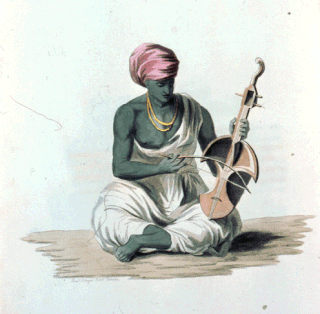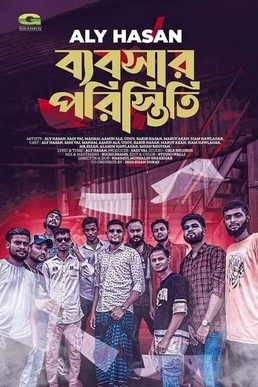Sarinda may refer to:
Sarinda may refer to:

Tripura is a state of India that has produced a wide variety of folk music. The musician Hemanta Jamatia gained major renown beginning in about 1979, when he became a musical representative for the separatist Tripura National Volunteers. He later on surrendered and returned to normal life, dedicating his work to the folk music of the Tripuri people. In recognition of his contributions to folk and modern music in the Tripuri language, he was awarded the highest honour in the field of music by the Government of India's Sangeet Natak Academy.
Bowed string instruments are a subcategory of string instruments that are played by a bow rubbing the strings. The bow rubbing the string causes vibration which the instrument emits as sound.
Muneer is a masculine Arabic given name, it may refer to:

A sarinda or saranda is a North Indian stringed folk musical instrument similar to lutes or fiddles. It is played with a bow and has between ten and thirty strings. The bottom part of the front of its hollow wooden soundbox is covered with animal skin. It is played while sitting on the ground in a vertical orientation.

The ghaychak or gheychak is a bowed lute used in Iran, Afghanistan, Pakistan and Tajikistan. The name is similar to the Central Asian ghijak, but that instrument is more closely related to the kamancheh.
There are many different dances of the Tripuri people, the largest ethnic group in the state of Tripura.

Sarinda is a genus of ant mimicking jumping spiders that was first described by George and Elizabeth Peckham in 1892.
The sumui (flute) is one of the most ancient and commonly played instruments in the musical tradition of Tripura. Sumui, is the most perfect and least mechanical of all the instruments. It is made of bamboo. There are two types of sumui, one having 7 (seven) holes and the other having 8 (eight) hole. Mostly found are two manipulator characteristic features:
S. nigra is an abbreviation of a species name. In binomial nomenclature the name of a species is always the name of the genus to which the species belongs, followed by the species name. In S. nigra the genus name has been abbreviated to S. and the species has been spelled out in full. In a document that uses this abbreviation it should always be clear from the context which genus name has been abbreviated.
Pride of Performance is a civil award given by the Government of Pakistan to Pakistani citizens in recognition of distinguished merit in the fields of literature, arts, sports, medicine, or science for civilians

The chikara is a bowed stringed musical instrument from India, used to play indian folk music. It is used by the tribal people of Rajasthan, Madhya Pradesh and Uttar Pradesh.
Lebang Boomani dance is a harvest dance performed by the Tripuri people of Tripura, India. It is one of two dances associated with the Tripuris, the other being the Garia dance that is performed at the time of sowing crops.
Dassanayake or Dassanaike is a Sinhalese surname.

New York in the 1960s is an album by Welsh-born musician John Cale. It was released in August 2004 on American independent label Table of the Elements. It was three-CD box set of Cale's recording from 1960s.
Sarinda Dassanayake is a Sri Lankan cricketer. He made his Twenty20 debut for Kurunegala Youth Cricket Club in the 2017–18 SLC Twenty20 Tournament on 25 February 2018. He made his List A debut for Kurunegala Youth Cricket Club in the 2017–18 Premier Limited Overs Tournament on 10 March 2018.

Sarinda hentzi is a species of jumping spider in the family Salticidae. It is found in the United States.
Munir Sarhadi was a Pashtun-Pakistani instrumentalist, sarinda player and a folk singer. As a musician, he represented Pakistan in several countries. Munir, in 1978 became the recipient of Pride of Performance, a civil award conferred by the Government of Pakistan.
Indus Blues is a 2018 Pakistani documentary film produced and directed by filmmaker Jawad Sharif. The film is about the dying folk and classical musical instruments of Pakistan and the struggle of musicians and craftsmen to keep their art alive. The film was premiered in August 2018 at Regina International Film Festival in Canada and nominated for the Best International Documentary Film Award. The official trailer was released in October 2018 in Pakistan.

"Bebshar Poristhiti" is a rap song by Aly Hasan released in 2022. The song went viral and appreciated in Bangladesh after its release on August 11. The song tells the story of a businessman's plight during the recession during the COVID-19 pandemic.